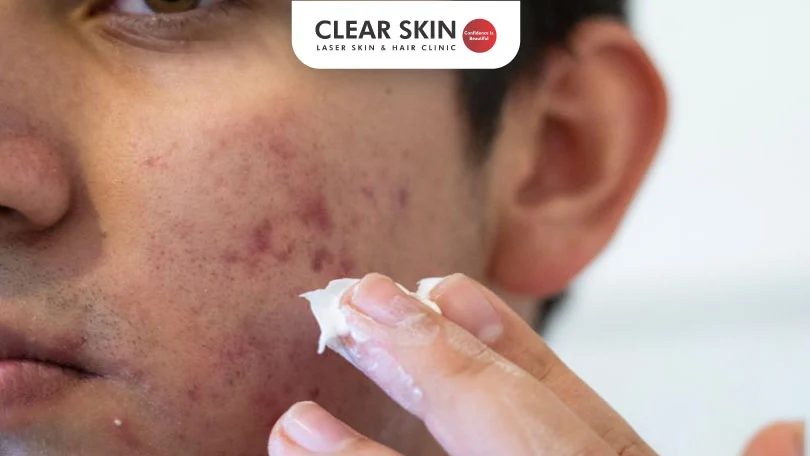5 Easy Ways to Remove Acne Marks

Written by Clear Skin Content Team | Medically Reviewed by Dr. Dhanraj Chavan on February 11, 2025

Dealing with acne marks can be frustrating and often leaves many searching for effective solutions. If you’re looking for easy ways to remove acne marks, you’ve landed at the right place. We are going to share some most effective and easy ways to remove acne marks.
Table Of Content
- What Causes Post-Acne Marks?
- How Can Topical Creams Help?
- Can Chemical Peels Reduce Acne Marks?
- How Effective Are Laser Treatments?
- Are Home Remedies Effective?
- How Important Is Sun Protection?
- How Do Exfoliating Face Washes Help?
- Can Diet and Lifestyle Changes Impact Acne Marks?
- Conclusion
What Causes Post-Acne Marks?
Post-acne marks, or pigmentation, can appear as red or dark spots on the skin. These marks are often the result of inflammation caused by acne. When the skin heals from an acne breakout, it can leave behind discoloration due to the overproduction of melanin, the pigment responsible for skin color.
How Can Topical Creams Help?
Retinoids
Retinoids are derivatives of vitamin A and are known for their ability to accelerate skin cell turnover. They help in removing the upper layers of the skin, thereby reducing the appearance of dark spots. Retinoids also reduce the activity of oil glands, which helps prevent new acne breakouts.
Common retinoids include:
Retinol: Available in over-the-counter products, retinol is effective for mild to moderate acne marks.
Tretinoin: A prescription-strength retinoid, tretinoin is more potent and can be more effective for stubborn marks.
AHAs
Alpha hydroxy acids, like glycolic acid, are effective in exfoliating the skin. They help to remove dead skin cells and encourage the growth of new skin cells. This process can lighten dark spots and improve the overall texture of the skin.
Other beneficial AHAs include:
- Glycolic acid: A popular AHA with a small molecular size that deeply penetrates the skin, exfoliates, and improves skin tone and texture
- Lactic Acid: Known for its gentle exfoliating properties, lactic acid is suitable for sensitive skin.
- Mandelic Acid: Derived from almonds, mandelic acid is effective for those with darker skin tones as it reduces pigmentation without causing irritation.
Using these creams regularly can lead to significant improvement in the appearance of acne marks. However, it’s essential to follow the instructions carefully and consult with the best dermatologist at Clear skin Clinic Pune if needed.
Can Chemical Peels Reduce Acne Marks?
Chemical peels are another effective method to reduce acne marks. These peels involve applying a chemical solution to the skin, which causes the top layers to peel off. This process reveals fresher, less pigmented skin underneath.
How Effective Are Laser Treatments?
Laser treatments are highly effective for reducing acne marks, especially those that are stubborn and do not respond well to topical treatments or best chemical peels treatment . Lasers work by targeting the pigment in the skin and breaking it down, which the body then gradually removes.
What to Expect from Laser Treatments
Laser treatments can be more expensive than other methods, but they often provide faster and more dramatic results. It’s important to have these treatments performed by a qualified professional to minimize risks and ensure the best possible outcome.
During a laser treatment session, you might feel a mild tingling or snapping sensation as the laser works on the skin. After the treatment, it’s common to experience some redness and swelling, which usually subsides within a few days. Multiple sessions are typically required to achieve the best results.
Are Home Remedies Effective?
Several home remedies can also help reduce the appearance of acne marks. Natural ingredients like aloe vera, tea tree oil, and turmeric have anti-inflammatory properties that can help soothe the skin and reduce redness.
#1 Aloe Vera
Aloe vera is known for its healing properties. Applying aloe vera gel to the skin can help reduce inflammation and promote the healing of acne marks.
How to Use?
Apply fresh aloe vera gel directly to the affected areas and leave it on for 20-30 minutes before rinsing off with lukewarm water. Repeat daily for best results.
#2 Tea Tree Oil
Tea tree oil has antibacterial and anti-inflammatory properties, making it effective in reducing acne and the marks it leaves behind. Dilute tea tree oil with a carrier oil and apply it to the affected areas regularly.
How to Use?
Mix a few drops of tea tree oil with a carrier oil like coconut or jojoba oil. Apply the mixture to the acne marks and leave it on overnight. Wash off in the morning with a gentle cleanser.
#3 Turmeric
Turmeric contains curcumin, which has strong anti-inflammatory and antioxidant properties. A turmeric mask can help lighten dark spots and improve skin tone.
How to Use?
Mix turmeric powder with honey or yogurt to form a paste. Apply the paste to the affected areas and leave it on for 15-20 minutes before rinsing off with warm water. Use this mask 2-3 times a week.
How Important Is Sun Protection?
Sun protection is crucial when treating acne marks. Exposure to the sun can darken these marks and make them more noticeable. Using a broad-spectrum sunscreen with at least SPF 30 can protect the skin from further pigmentation.
Why Is Sunscreen Essential?
Sunscreen protects the skin from harmful UV rays, which can exacerbate pigmentation and slow down the healing process. Applying sunscreen daily, even when indoors, helps prevent further damage and allows Best treatments for acne marks to be more effective.
Tips for Using Sunscreen:
- Apply sunscreen at least 15 minutes before going outside.
- Reapply every two hours or more often if swimming or sweating.
- Use a sunscreen that is suitable for your skin type, especially if you have sensitive or acne-prone skin.
How Do Exfoliating Face Washes Help?
How Do Exfoliating Face Washes Help?
Exfoliating face washes can aid in removing dead skin cells and reducing the appearance of acne marks. These face washes often contain ingredients like glycolic acid or salicylic acid, which help to unclog pores and promote skin renewal.
- Glycolic Acid: An alpha hydroxy acid that helps to exfoliate the skin and lighten dark spots.
- Salicylic Acid: A beta hydroxy acid that penetrates the pores and helps to reduce inflammation and acne.
Using an exfoliating face wash 2-3 times a week can help to maintain clear skin and reduce the visibility of acne marks. However, be careful not to over-exfoliate, as this can lead to skin irritation and worsen pigmentation.
Can Diet and Lifestyle Changes Impact Acne Marks?
Your diet and lifestyle can also play a role in the appearance of your skin. Eating a balanced diet rich in vitamins and antioxidants can promote healthy skin and reduce inflammation.
Vitamin C-rich foods
Citrus fruits, strawberries, and bell peppers help in collagen production and skin repair.
Omega-3 fatty acids
Found in fish, flaxseeds, and walnuts, these help to reduce inflammation.
Zinc
Foods like pumpkin seeds, spinach, and lentils are rich in zinc, which aids in skin healing.
Staying hydrated by drinking plenty of water and avoiding excessive consumption of sugary and processed foods can also improve your skin’s appearance. Regular exercise and adequate sleep are equally important in maintaining healthy skin.
Do You Know?
Roughly 250 Patients Are Treated
Everyday By These Dermatologists
(You are one click away from flawless skin)
Meet Our Dermatologist!
Conclusion
Removing acne marks involves a combination of treatments and consistent skincare. Topical creams, chemical peels, laser treatments, home remedies, and sun protection all play vital roles in reducing pigmentation and achieving clearer skin. But it’s important to consult with the best dermatologist to create a tailored plan for the most effective results.
With dedication and the right approach, you can significantly reduce acne marks and enjoy clearer, more radiant skin. For any further information, talk to our experts today. They are available and ready to answer all your questions.
Further Reading
Dry Skin and Acne
Discover how to combat dry skin acne & achieve radiant skin. Expert skincare tips to hydrate & prevent breakouts. Visit Clear Skin Clinics Pune for solutions.
Why Acne Comes Back After Stopping Treatment? – Pune Insights
Discover why 20-50% of acne patients experience relapse after stopping treatment. Learn about hormonal factors, Pune’s monsoon impact, maintenance therapy importance, and Clear Skin Clinic’s proven prevention strategies.”,
Pune Acne Treatment Costs – What to Expect in 2026?
Complete guide to acne treatment costs in Pune 2026. Transparent pricing for chemical peels, laser treatment, and isotretinoin at Clear Skin Clinic
Laser vs Microneedling – Best Acne Scar Treatment in Pune?
Best acne scar treatment in Pune? Compare fractional CO2 laser vs microneedling — results, cost, recovery & safety at Clear Skin Clinic Pune.
Have thoughts? Please let us know
We are committed not only to treating you, but also educating you.





